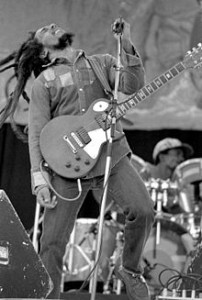[contextly_auto_sidebar id=”3BXI0gx6g2APPzSTAgIfCMxuJKZAolOM”]
RACING on a deadline, but can’t resist posting this 1973 footage of Marley singing Concrete Jungle with the original Wailers. Sorry for cacophonous ad at beginning. Listen to those harmonies! This is like post-apocalyptic soul music.
In my 20s I was a huge fan of ’60s/early ’70s Jamaican music (ska, rocksteady, lovers rock, dub) and interviewed the great producer Coxsone Dodd.
My favorite Marley may be the acoustic medley, including the song “Hurting Inside,” the appears on the box sex Songs of Freedom. But songs like “Rebel Music” are hard not to love as well.
RIP to a great, passionate, political artist who fought for what he believed in but was felled by cancer far too young .
.

Marley’s music is ok, but for me his work, and most of the rest promoted by the mass media, does not justify the bell curve economics of the pop-music-industrial-complex. I feel this domination is a central part of cultural crash. The domination of the pop-music-industrial-complex undermines local cultures and the public for more complex forms of art, both of which are essential to a culturally sound and pluralistic society.
If we are to embrace all forms of music without artificially constructed hierarchies, which would presumably include everything from brass bands to harmonica ensembles, why are the aesthetics of this so-called emancipation almost exclusively centered around guitar-playing males who are stars in the pop-music-industrial-complex? I mean people like Marley and almost all the other examples you mention. Now that the git-playing male is slowly fading, the new singular focus of our self-contradictory pluralism is hip-hop. Apparently no one notices how the pop-music-industrial complex always comes out on top.
I like the French model that taxes the mass media to better fund local and more varied forms of culture than males playing guitars, even if this won’t happen in the USA. The MPAA represents 6 major studios who each pay $20 million per year to the organization to lobby congress. Former Democratic Senator Chris Dodd is the current chairman and CEO – an obvious illustration of cultural plutocracy.
Since 2001, the RIAA, which correlates closely to the MPAA in its totalizing cultural domination, has spent $2 to $6 million each year on lobbying in the United States.
I am thus not inclined to praise and add additional promotion to the music of their so-called stars of – and especially not under the rubric of trying to study and find solutions to the problems of culture crash. If these artists were genuinely so much better than everyone else the bell curve would be justified, but they aren’t. Their appeal is a social construct created by a massive publicity machine.
Under neoliberal philosophy, autonomy has degenerated into a dogmatic, pseudo-heteronomy that ironically serves a totalizing pop pop-music-industrial-complex. In an ironic search for pluralism, our ability to critically judge the validity of external authority has been even further weakened.
I think your link to Concrete Jungle is broken, but here’s one also from 1973 with very good sound:
https://www.youtube.com/watch?v=YgyVcUhuZ4E
I can agree w some of that but:
a) Marley and whole galaxy of JA music going back to ska was first music from “Third World” to really sell — it’s a case of a rich local culture being popular both locally and globally. Some JA musicians really made money too, It also had a real political spirit to it.
b) I like many things from the French model for culture, but their rock/ pop music is embarrassing with a very few exceptions. I am no fan of neoliberal economic model, but I will take rock music from the US-UK axis (which includes JA) over the Gallic, German, Nordic, Italian, etc. any day of the week.
Indeed that was the Concrete Jungle link I tried to post; sorry but now restored.
Pop doesn’t dominate the continental European cultural landscape to the extent it does in the USA, and that is exactly the point. There is more pluralism in their music worlds. They even take a kind of pride in the limited status of their pop music, as if that in itself were a measure of their culture and their success in resisting American hegemony and cultural values.
That’s an interesting idea about JA being the first “world music.” I think it might have been preceded in some ways by Cuban music during the later big band era which was similarly popular. About the same time JA music became popular, the Tijuana Brass did too with a pop version of mariachi. It might be that the appropriation of world music, which often contains an element of bowdlerization, is actually one more example of the pop-music-industrial-complex’s totalizing hegemony.
I’m still interested in the idea of why guitar oriented music remains the mainstay of postmodern aesthetic leveling while more varied pop groups like the Tijuana Brass, Blood Sweat and Tears, Chicago, or Stevie Wonder are not included. Is this due to some sort of critical discernment, or is there an ironic bias involved? How does postmodernism rationalize its aesthetic leveling in light of its own forms of critical evaluation?